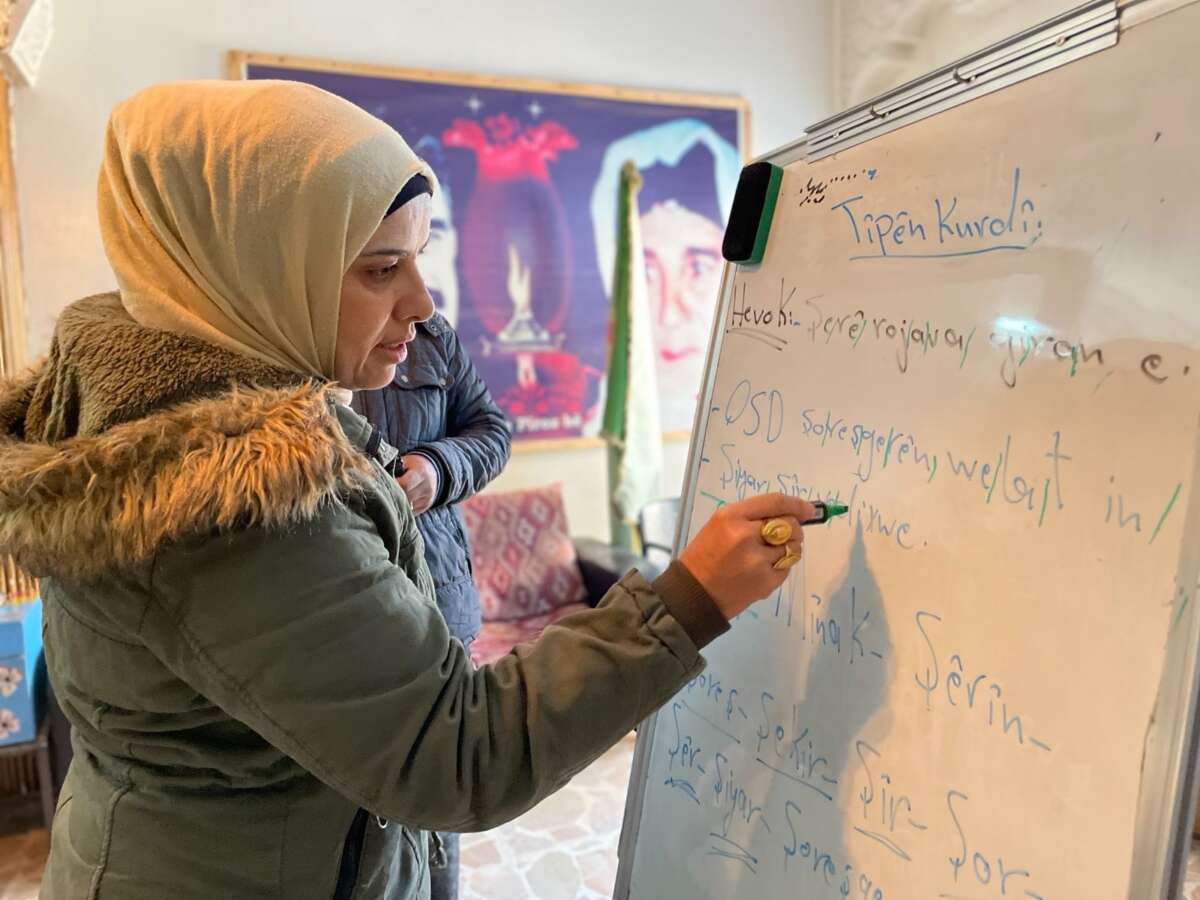Honest, paywall-free news is rare. Please support our boldly independent journalism with a donation of any size.
In the late 2000s, a group of women in their 50’s in a city in northeastern Syria heard a story about a young woman who had been chained up in her home by her father and brother. The women visited the home to intervene, pretending to be interested buyers, and encountered a visibly nervous and irritated man at the door who told them it wasn’t for sale. When he tried to slam the door in their faces, one woman stopped the door with her foot and, knowing it’s extremely rude in local culture to deny hospitality, convinced him to let them inside by insisting he give them water. Once inside, the women confronted him: They knew a woman was being held against her will in the home and they wanted to see her. After returning to the home many times, for a half-dozen back-and-forth meetings, they eventually convinced the men to set her free.
This group formed the basis for what is now a growing women-led restorative justice system that operates within the territory of the Autonomous Administration of North and East Syria (AANES), also known as Rojava, a revolutionary social experiment involving more than 4.5 million people. The system features a network, autonomous from the AANES, of more than 60 Mala Jin, or “women’s houses,” which allow people to solve disputes at the community level, instead of through courts or police, by offering reconciliation and mediation processes for domestic and family situations.
To learn more about this system, Truthout spoke with activist and independent researcher Clara Moore, who recently returned from spending two years in the region, working at both the Rojava Information Center and at Mala Jin. In this interview, Moore discusses Rojava’s governance structures, women’s role in the revolution and walks through a hypothetical example of a case working through the restorative justice system.
This interview has been lightly edited for length and clarity.
Ella Fassler: The restorative justice system we’re focused on is part of this much larger revolution in Rojava (West Kurdistan) and North and East Syria. Can you give us a short overview of the guiding principles and governance structures in Rojava to help ground the conversation?
Clara Moore: Sure! Essentially, they’re trying to build a system around the political philosophy of Democratic Confederalism, which was initially inspired by the ideas of [the American intellectual] Murray Bookchin and theorized by [Kurdish leader] Abdullah Öcalan from prison in Turkey. It’s based on ideas of pluralism, direct democracy, decentralization, gender equality and self-defense. In practice, this means that all communities have the ability and right to defend themselves and provide for their own needs. It grew out of the Kurdish freedom movement but it’s an anti-statist project, meaning they’re not trying to create a Kurdistan, or any sort of ethnically based state project. They’re creating a decentralized system in which all ethnic groups in North and East Syria have self-determination, and all ethnic groups in the region participate, including Arabs, Christian Syriacs and Assyrians, Turkmens, and more. They are hoping it will be a model for a decentralized Syria once the war ends.
What that looks like on the ground is that there are communes at the neighborhood or village level, which is the sort of the point of contact for each person to get politically involved. Then the concerns from the communes ladder up to higher levels of the Autonomous Administration from the neighborhood, to the municipality, then the district, and so on.
Gender equality is built into the structure, and so is ethnic representation. You can see this most clearly in the “co-chair” system, which is really unique and remarkable. At every level, from the commune all the way to the “higher” levels, both a man and a woman sit in the executive seat together, and make decisions jointly. There is always an effort to make sure that they are different ethnicities to reflect the local population as well.
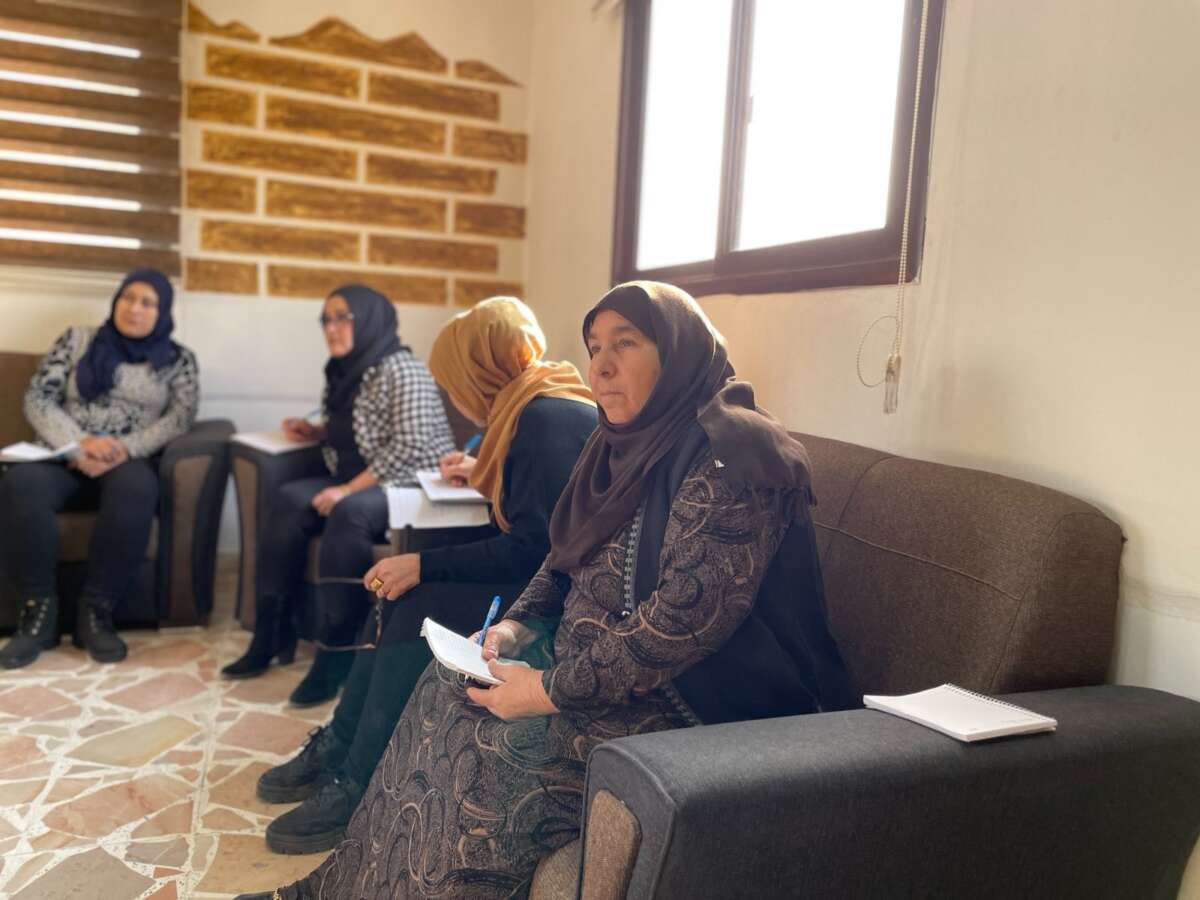
What is the justice system like there in broad strokes?
The idea of the justice system in Rojava, in North and East Syria in general, is that it’s possible to solve a dispute without going to court. There are laws in Rojava and courts. But the system is built up so that ideally, those only become relevant when people can’t come to a resolution together outside of court. There are reconciliation structures set up for different types of issues. Mala Jin, for example, now serves the purpose of mediating domestic and family issues specifically. For context, this is a region with an active ISIS insurgency, so the situation is not simple. Violent crimes tend to go straight to court, and there are prisons, but the bulk of the system is built off of a restorative justice model.
What role did women play in the early phases of the revolution and how did it relate to, or influence the development of, the restorative justice system?
To begin, ideologically, women’s liberation is at the basis of the revolution, it’s one of the nonnegotiable pillars. Before 2011, under the Syrian regime, women were able to organize more clandestinely. Compared to men, they would get stopped less by the police going from house to house with pamphlets or other political material. Of course, eventually, the regime caught on and they started getting stopped more. But at the beginning, it was the women doing a lot of the organizing.
Their work grew into what is now Kongra Star, a women’s organizing body that is autonomous from the AANES, which helps women get politically organized, and which also handles women’s issues in general in a society. The Mala Jin system grew out of and within Kongra Star, and is still connected to it, but also now integrated into the wider justice system.
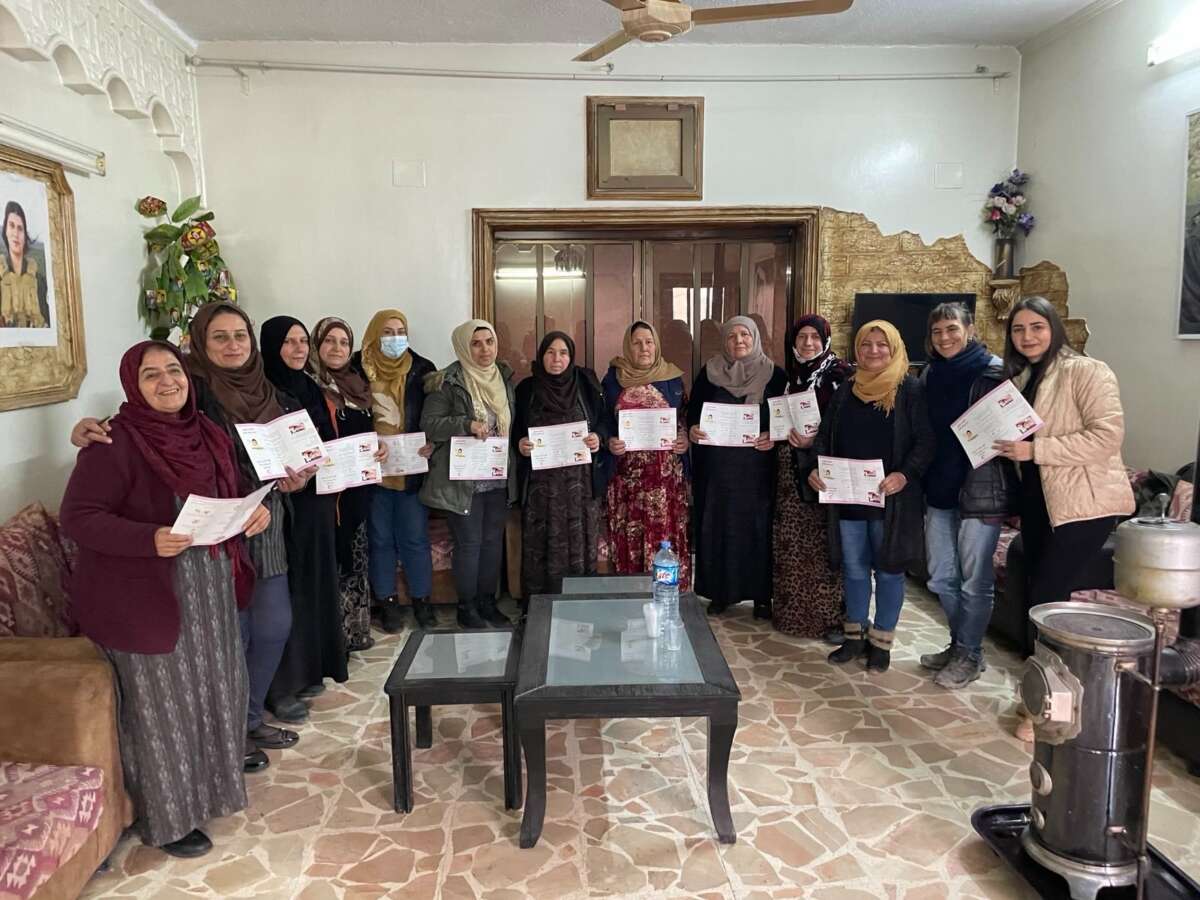
How is Mala Jin funded?
Mala Jin is funded by Kongra Star. Women receive a very, very modest salary for their involvement. The idea of Mala Jin is that you do it primarily out of a desire to help other women and the revolution, but in general, most of the women who work there are married, and mothers, and have husbands or live with their family or have family support. On the ground, there is a familiar and interesting tension and dialogue between a traditional society that puts family values at the center of a life, and the movement that’s trying to build up women’s independence and equality. Currently, women would not be able to support themselves with a Mala Jin salary.
Can you walk us through an example of a case that Mala Jin might take on?
I’ll take a really simple one, which is a divorce. Consider a couple where one party wants to get a divorce and the other one doesn’t. And under the women’s law — which was originally created by Kongra Star in 2014 and updated with a changed name to the Family Law in 2021 — a woman has a right to seek a divorce. So first, you would go to the social reconciliation committee in your commune. This committee is hyperlocal so they will likely know you already, and they can help you find a solution and decide how much alimony you want to get, figure out the situation with your children and everything. Then you can just come up with a resolution and bring it to a Mala Jin who will sign off on it, and then the court will sign off on it.
If you can’t find an agreement with your husband at the commune level, the reconciliation committee will send you to the Kongra Star office, which is the neighborhood-level Mala Jin and they will sit down with you and try to come up with a solution. If you find a solution there, then they sign off on it and you can bring it to court to file the agreement.
Then if you still can’t find a solution — like, if you’re the wife who really wants to get divorced, but the husband is really refusing — then you would go to the citywide Mala Jin. I’ve seen people come in as many as four or five, sometimes six times to just talk things through at this level. They listen to both sides of an equation separately, and also together, and also give them space to talk alone.
If they come to an agreement, the Mala Jin has a social solidarity committee that follows up with the agreements, mostly through WhatsApp, although sometimes they do home visits, just to make sure that everything is being adhered to. And then for a case, which included abuse or something like that, it would be the Asayish that would follow up, which is like the police. And there’s a women’s Asayish that does a lot of that work.
And then if it can’t be solved at the Mala Jin, it goes to the existing court and people can hire lawyers to come with them. You must go to the Mala Jin first though, and the woman from Mala Jin who was following your case will be there at the court case and will give her opinion to judges. There are three judges on each case, at least one of which is a woman. There are certain laws within the Family Law about who has rights to what, and if it gets to court, those things will (within reason and non-dogmatically) be sort of “enforced” at that point. And then the judges themselves will write up the contract, and people will have to sign it.
In the United States, there is a lot of rhetoric around abolishing police and prisons completely, particularly after the George Floyd uprising. Is that part of the conversation there?
Yeah, absolutely. I think their idea is — and it’s similar to the way that it gets talked about radical spaces here — is that you don’t have police, you have community defense.
In Rojava, they have the community defense forces called the HPC, or sometimes people call them affectionately grannies with AKs. The women and the men can be older and can be anyone, going around and making sure the community is safe.
The idea is that, ultimately, you would just need community defense forces who know their communities and who are more responsible for their community’s safety and health.
But right now, there’s also the Asayish, which are similar to a police force. ISIS is still an insurgency there. There is absolutely not a practical situation on the ground where there is enough community cohesion and peace to not have a strong militia or police force that has the ability to counter elements of the society that are trying to destroy the entire project, society and harmony.
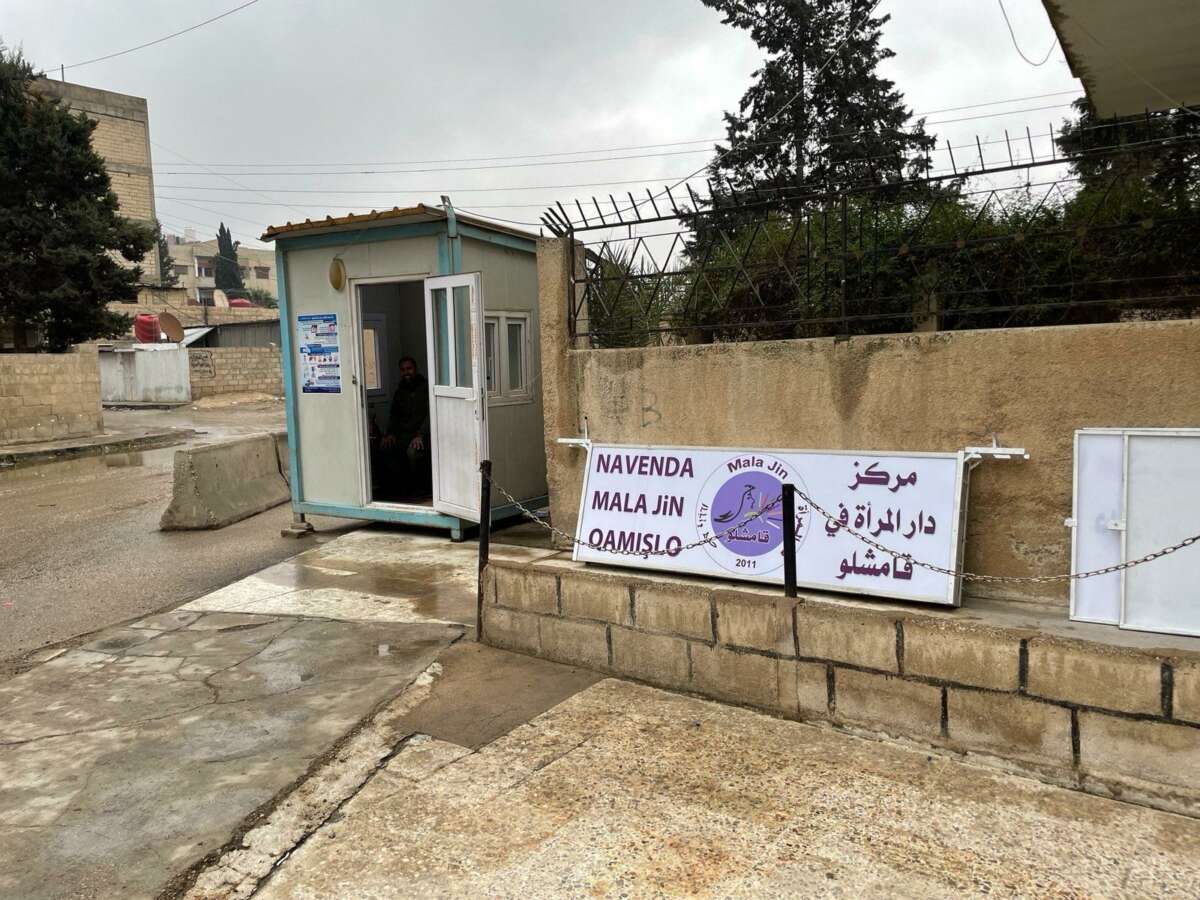
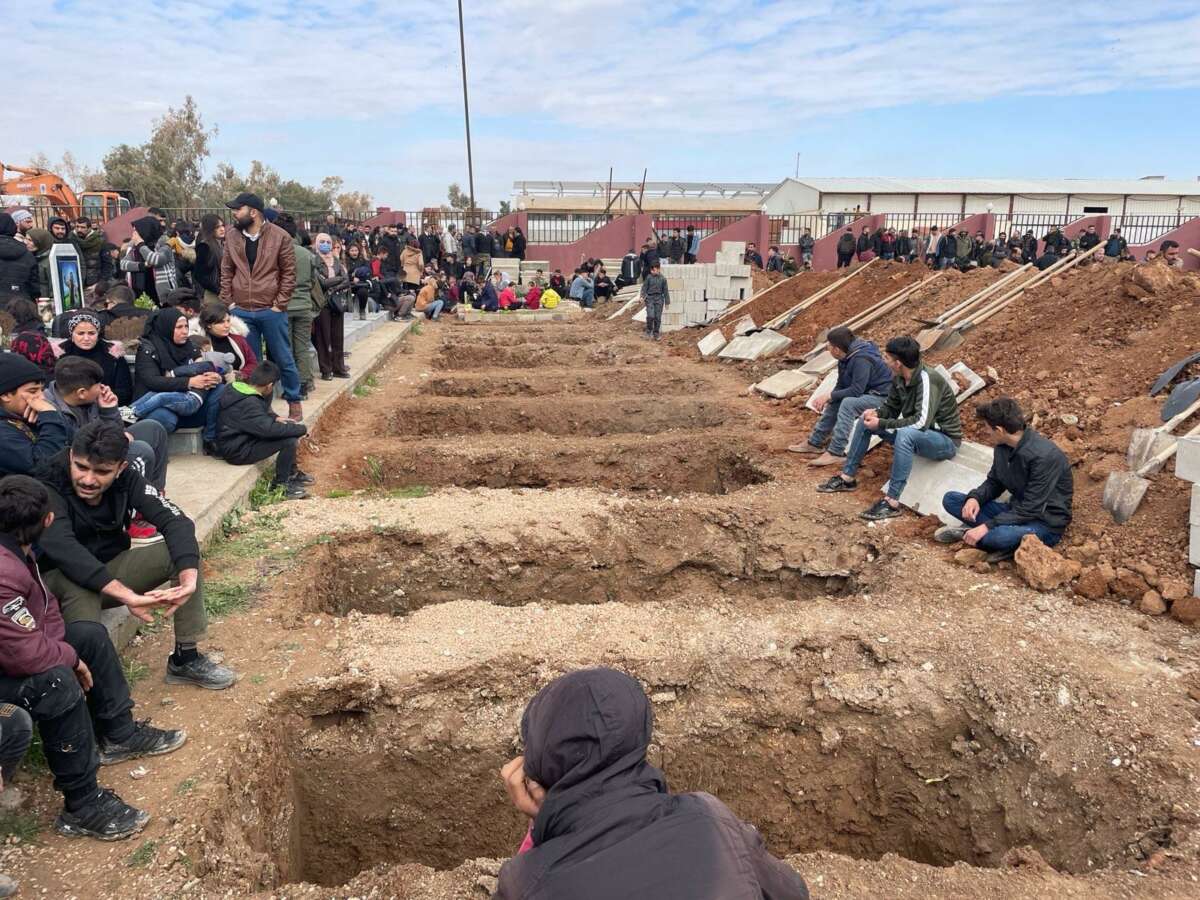
I imagine witnessing the messiness of that situation may lead to some insights or understanding about the nature of contradiction within the revolutionary process. What are some lessons you learned from your two years in Rojava and at Mala Jin that may be useful for U.S.-based organizers?
One is that social change is slow. You just have to begin and then as you work, your process will and should evolve. Not everything has to be perfectly in place before you begin community work, it will and should evolve with the community.
And then you have to be ready for and remain strong against community backlash. Have boundaries for what you will tolerate and what you won’t, but at the same time, keep your eyes open to the differences between what a radical movement might envision and what the community wants and is ready for. You’re working for and with the community, not trying to be dogmatic and authoritarian.
You have to be willing to sit down with people you disagree with. What the Mala Jin does all day, every day is sit down with really patriarchal men, maybe women who have certain ideas they don’t agree with, and they just talk about it, listen to them, they talk to them. And over the years, this has made a really material difference in the way that society approaches these issues. In each individual conversation, you might not feel the needle moving. But in an aggregate of a conversation held over the years in different rooms with different people, things start to change.
There is a certain amount of dedication and sacrifice that it takes to show up every day. It’s not going to be sexy the whole time.
Having self-control, self-discipline and decentering yourself is really important when you’re doing restorative justice work for the community. At the Mala Jin, it was very difficult to hear people saying really harsh, difficult things about women all day. But it’s not about your personal feelings in that situation, it’s about the slow process of social change, and acknowledging where a community is, so it can eventually be somewhere else. People feeling heard in a room will maybe slowly change the needle, and that process will make a lasting impact on the community at large. It’s really not about you proving in each situation that you are the most radical person and the person with the perfect idea. It’s really not about you proving anything about yourself. When we’re doing this work, we’re doing it for and with the community, and that’s where your sense of self will come from. That’s where our sense of self should arise from, is from being a part of community and being of service while also honoring yourself and your boundaries.
Press freedom is under attack
As Trump cracks down on political speech, independent media is increasingly necessary.
Truthout produces reporting you won’t see in the mainstream: journalism from the frontlines of global conflict, interviews with grassroots movement leaders, high-quality legal analysis and more.
Our work is possible thanks to reader support. Help Truthout catalyze change and social justice — make a tax-deductible monthly or one-time donation today.
